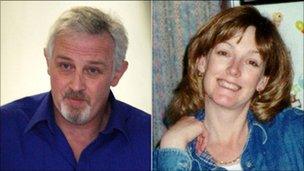Nat Fraser wins appeal to quash murder conviction
- Published
A man jailed for life for murdering his wife in Elgin in 1998 has won his appeal to have his conviction quashed.
Nat Fraser, 52, was ordered to spend at least 25 years in jail after the High Court in Edinburgh heard he ordered a hitman to kill his wife, Arlene.
She was last seen on 28 April, 1998, waving her children off to school. Her body has never been found. Mr Fraser was convicted in January 2003.
Arlene's family said they were disappointed by the appeal decision.
When Mr Fraser exhausted the appeal process in Scotland, Mr Fraser turned to Supreme Court judges in London to overturn his conviction.
Five judges at the Supreme Court have now remitted the case to the Scottish Court of Criminal Appeal.
Granting the appeal, the Supreme Court judges said in their deliberations, external: "The Supreme Court unanimously allows the appeal. It remits the case to a differently constituted Appeal Court to consider whether to grant authority for a new prosecution and then, having considered that point, to quash the conviction."

Nat Fraser was jailed in 2003 for his wife Arlene's murder
The Crown Office said it would now seek to bring fresh proceedings against Nat Fraser.
In a statement, Arlene Fraser's family said: "Today's decision by the Supreme Court is bitterly disappointing. We accept today's decision. However, we fully support the Crown's intention to seek authority to bring fresh proceedings against Nat Fraser for Arlene's murder."
Fair trial
Mr Fraser's legal team argued there had been a miscarriage of justice, centring on claims that evidence was tampered with and prosecutors had not been given all of the facts.
At the Supreme Court hearing his QC, Maggie Scott, said: "The essential question is whether or not the appellant received a fair trial."
It was the second appeal for Nat Fraser, who ran a fruit and vegetable business in Elgin, Moray.
Relatives of Mrs Fraser, who was 33 when she disappeared, travelled to London for the two-day hearing.
A cornerstone of the case against Mr Fraser was his wife's rings, which she always kept on a small wooden rail in her bathroom.
When police originally searched the family home they were missing - their subsequent re-appearance later in the police investigation led to Nat Fraser being charged.
But in 2007 the appeal court in Edinburgh, where Mr Fraser was challenging his conviction, heard police and the local procurator fiscal may have known more about them than they told prosecutors.
At the hearing Nat Fraser's QC, Gordon Jackson, said this amounted to as good a ground of appeal as he had lodged.
The court was also told two significant investigations were launched into the way the original criminal investigation was carried out.
That appeal was rejected, and Mr Fraser turned to the UK Supreme Court, having exhausted all legal avenues in Scotland.
Delivering the opinion of the Supreme Court, Lord Hope said: "Consideration will now have to be given to the question whether authority should be given for a new trial. This matter is best dealt with by the High Court of Justiciary.
"So the case will be remitted to that court for this question to be dealt with, and it will be for that court to quash the conviction."
Criminal law
Meanwhile, First Minister Alex Salmond challenged the right of the UK Supreme Court to rule on Scottish criminal cases.
Mr Salmond stressed he was offering no opinion on the case itself, but pointed out that Scotland's criminal court system had been distinct for centuries, with the High Court the final arbiter.
The first minister said the UK court should have "no role" in Scottish criminal law.
The UK Supreme Court is able to rule on cases where Scots law conflicts with human rights legislation and there are proposals to allow it to be the final court of appeal in certain Scottish criminal cases.
- Published21 March 2011
- Published1 March 2011
- Published31 May 2010